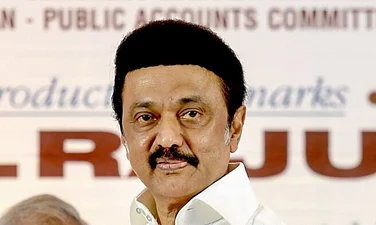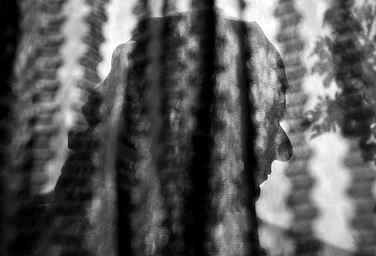The request is unusual, and brings a broad grin on the face of Mehbooba Mufti. It is an interaction the chief minister is having with a delegation of Pandits from their Sheikhpora colony, just three km from Budgam where they have now assembled ahead of autumn. Sanjay Raina, who heads the team, begins the conversation by praising the CM. He sings paeans about Mehbooba’s late father-leader Mufti Mohammad Sayeed, but the CM politely cuts that talk short. “Please start with your problem,” she says, waving her hand softly. They come up with a suggestion, which is what makes the CM smile.
For, Raina and the relocated fellow Brahmins totalling 3,000 say they want to live in close association with the native Muslims in their neighbourhood. “We should not be confined to the Pandit colony,” he adds, referring to the 365-flat gated settlement established in 2004 after their displacement in the 1990s following an outbreak of insurgency in the Valley. “We want to settle outside of the ghetto. We feel suffocated.” The CM says she will look into the matter and other demands of Pandits.
They vacate the lawns. There is another delegation being heard now at the Dak Bungalow, where the district administration has erected two marquees. The larger tent, which is near the entrance of the two-storey structure, has the elite National Security Guards playing host to the people who have come from different constituencies of Budgam district adjoining Srinagar. They will be sent in groups to meet the CM, sitting that sunny Sunday under a neatly decorated canopy. Assisted by top officials of the district and the state, she would listen to the visitors’ complaints, and pass on directions to the officials after seeking an explanation from them.
What is on is an outreach programme by Mehbooba, commonly called Baaji (elder sister). Eighteen months have passed since J&K got its new CM, but much of that has been spent dealing with the unrest that began in July last year. The trigger was the killing of 22-year-old militant commander, Burhan Muzaffer Wani, by security forces on July 8. Protests lasted about eight months, during which the security forces and the police killed over 90 protesters and wounded 15,000 in bullet and pellet firing. The turmoil also led to a spurt in militant recruitment, especially in south Kashmir, often seen as the bastion of the ruling Peoples Democratic party (PDP). In fact, no less than 80 youths from south Kashmir have joined militancy since this January.
More clashes erupted since then. On April 9 in Budgam, firing by security forces killed eight persons and wounded scores during elections. It was a by-poll to the prestigious Srinagar-Budgam Lok Sabha seat. The voter turnout was an abysmally poor 7.14 per cent. The day saw Major Leetul Gogoi tying a voter, Farooq Ahmad Dar, to the front of his jeep to create a fear psychosis among the stone-throwing youths. Dar’s picture, according to former Northern Commander of Indian Army, Lt General H. S. Panag, became a defining image of the 27-year-old Kashmir insurgency. He tweeted thus: “image of a ‘stone pelter’ tied in front of a jeep as a ‘human shield’ will 4 ever haunt the Indian Army & the nation.”
As protests erupted in Budgam, the Election Commission was forced to defer the April 12 bypoll for Anantnag. Later, on May 25, the poll body cancelled that election because of the “scary” situation in south Kashmir, where the Lok Sabha seat had fallen vacant last year after Mehbooba, as its MP, became the CM.
The 2016 killings and blinding of you-ths continued to haunt the PDP, adding to the discomfort of its alliance with the ideologically antithetical Bharatiya Janata Party (BJP) in the state. While the 1999-founded PDP had once been soft on separatists, the saffron party and its allied Rashtriya Swayamsevak Sangh regularly talk about the abrogation of two constitutional clauses related to J&K’s special status. While Article 370 grants autonomous status to the border state, 35-A gives J&K legislature a carte blanche to decide who all are the state’s permanent residents. The differences over the matters have added to the complicated relations between the two parties, often earning them the ignominy of being power-crazy at the cost of principles.
In this backdrop, the 58-year-old CM’s outreach is seen as a move to reconnect with the people, who the party perceives are angry with the PDP-BJP tie-up. Mehbooba’s party, founded by her father who was a two-time CM and also a Union home minister briefly, feels politically decimated due to last year’s unrest, prompting its leadership to spread the government’s message of good governance among the people.
On October 8, on the chair adjacent to the CM at the Budgam event was her cabinet colleague Ghulam Nabi Lone Hanjura in charge of agriculture. Next to him was PDP legislator Saifuddin Bhat. Behind him, was another PDP leader, Muntazir Mohiuddin. There was no MLA or MLC from other parties.
After the Pandit delegation from Sheikhpora came a group from Ompora village of Budgam. They spoke of water shortage. The CM directed the officials that the complainants be provided with water from the Suknag scheme. The group exits, and in comes a delegation, whose leader introduces himself as a supporter of the PDP. That, again, doesn’t interest the CM, who welcomes the head to straightaway reveal his grievance, adding, “I’m here to listen to all my people, not party workers.” The redressal exercise continues through the day.
“It is the top-down approach from the government,” says PDP youth leader Waheed-ur-Rehman Parra, secretary of the sports council. “Earlier the file would go from the district office to the CMO, now it comes with directions from the CMO to the officials. This will change governance,” avers Parra, adding that the delegations at Budgam also demanded stadia and other sports facilities.
Not far from the Dak Bungalow, peo-ple show a pervasive sense of insecurity. “Braid-chopping incidents are taking place at an alarming rate,” says a member in a group of people at Budgam Chowk, about recent instances where strangers spray chemicals on women and cut their hair after they fall unconscious. “We feel that (intelligence) agencies have a hand in it. The government is doing nothing.”
The government has not issued a formal statement on the incidents of braid-chopping, except increasing reward to Rs 6 lakh to informants who would provide any clue about the “criminals”. A predominant view within the police is that hair-cutting is a psychiatric disorder. Top cops term such incidents as “hysteria”, even as the public largely refuses to buy the version. The police fear the incidents may trigger serious law and order problem.
The CM, during her outreach, didn’t make any political speech. “It is a governance outreach,” points out Naeem Akhtar, spokesman of the coalition government. “We are getting positive feedback. The CM will continue the programme.”
The Opposition is not impressed, what with the government finding it difficult to hold a Cabinet meeting. “If it is convened, it’s in the absence of ministers,” says Junaid Azim Mattu, spokesman of the National Conference. “In such a scenario, the outreach is futile.” The Congress alleges that the CM had anyway lost her credibility long ago. “These shows will not restore it. They are managed by the party,” says Ghulam Ahmad Mir, the party’s state president. “If the situation is conducive as the CM portrays by visiting the districts and staying there overnight, then the government should give its consent for the Anantnag bypolls.”
Hakim Yasin, who is the Peoples Democratic Front MLA from Khan Sahab constituency that falls in Budgam, says he sent two delegations to meet Mehbooba. “We put forward 16 demands. Let us see what will happen to them,” he says. “A majority of things the CM anno- unced at Budgam are already in the district plan. I see it as the PDP chief’s darbar with her workers.”
Former minister Ghulam Hassan Mir, who is president of the Democratic Nationalist Party, puts it differently. A founding PDP member, he says Mehbooba and the PDP have “now realised that it is a party without people’s support.” He describes the outreach as a good step. “The point is such meetings should make an impact on governance front.”
The government believes the outreach is making an impact. “The coming months will see a sea change in the state on the governance front,” states spokesman Akhtar. For that to actually happen, political observers say, the PDP will have to get its alliance partner adopt an empathetic approach to Kashmir’s problems, thereby make it easier—if at all—for the CM to reconnect with people.
By Naseer Ganai in Budgam


























